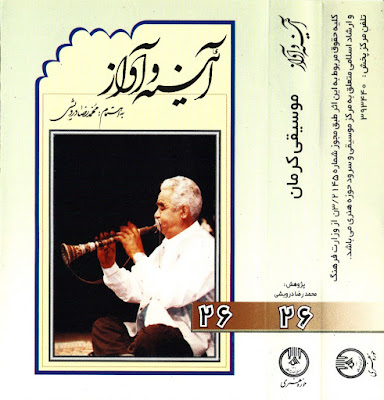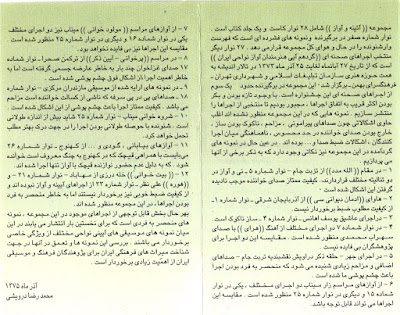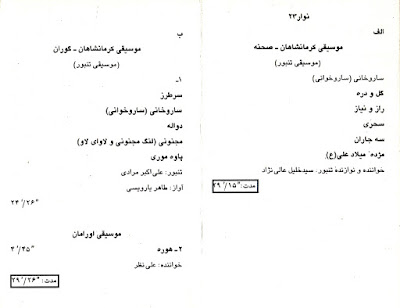Side A & Side B:
Music from Kurdistan - Sanandaj
Qaderiyye Khaneqah Ritual
Khalife Haj Mirza Aqa Ghowsi
This cassette has been published on CD in 2015 with a good booklet in English and Farsi by Mohammad-Reza Darvishi:
Khalife Hâj Mirzâ Âqâ Ghowsi (Vocal & Daf) & Qâderi Sufi Music
Ensemble of Kurdistan - Qâderiyye Khaneqah Rituals, Sanandaj, Kurdistan -
Regional Music of Iran 56: The Zekrs of Qâderiyye Khâneqâh in Sanandaj - The
group of Great Dervishes from Sheykh Mohammad Kasnazâni’s Qâderiyye (59:13),
MAHOOR, M.CD-433
"Qâderiyye, one of the most important Sufi orders, is ascribed to
Abdulqâder Gilâni (Jilâni) and has many followers in Iran, Iraq, Turkey, Syria,
and a vast area from India to North Africa and even Eastern Europe. Their main
center is in Kurdistan, Iran. Their followers in Iran are in Kermânshâh,
Baluchestân, and several other places.
Zekr ritual takes place on Monday and Thursday nights in Khâneqâh.
Dervishes enter the place after having Vozu (partial ablution); they perform a
two-Rak’at prayer called Tahiyyat (in order to respect the place), they kiss the
flag and the Qurân of the Khâneqâh (in order to consecrate themselves); they
shake hands with the khalife, who is the conductor of the ritual, then sit down,
and start reciting the rosary . After half an hour panegyrists begin to play the
daf and sing songs praising God, Prophet Mohammad, his descendants and other
saints. At this moment the dervishes go into trance and they all get
enthusiastic, this takes almost half an hour. Then they say a Salavât (prayers
for praising God, Prophet Mohammad, and his descendants) and they all sit on
their knees in a circle and start saying Zekr or Tahlil. At this stage, all the
dervishes and the khalife repeatedly say the following zekrs: Lâ elâha ellallâh,
Astaqfirullâh, Yâ Hu, Yâ Hayy, Yâ Qayyum, Yâ Dâ ’em.This step also takes half an
hour. Then it’s time to say Qiyâm Zekr (prayers while standing up) or Samâ’ when
the dervishes uncover the heads to let their long hair swirl from one side to
the other, and along with the daf and tâs music they start saying Zekr-e
Hayyallâh , and gradually reach the state of ecstasy. While saying Qiyâm Zekr,
the dervishes ask for the khalife’s permission to do some extraordinary things,
such as eating glass, blade or stone; pricking their bodies on daggers, skewers,
or any other sharp metals, etc. This part ends with praying and reciting
Fâtehah.
Qâderiyye followers also perform Samâ’ with daf and tâs music on some other
occasions, such as welcoming the Order’s sheykhs, promoting the Order out of the
Khâneqâh, and performing some holy rituals like “Pir Shâliyâr” in Orâmân.
Daf: The daf is the main musical instrument for the rituals in Qâderiyye
Khâneqâh in Kurdistan. Although the musical culture of Iran’s different areas is
very much entangled with the daf, its association with Kurdistan -at least after
Qâderiyye Order was established by Sheykh Abdulqâder Gilâni ( 471-561 Ah), and
because of the Order’s followers particular use of this instrument - has been
even more significant. The daf has been given the following names in different
areas of Iran through time: Dap, Bâter, Dezire, Dub, Dâyere (and different
altered dialectical forms like Dâriye, Diyâre, and Dayare). In Arabic language
it is known as Sammâ, Qarbâl, Qarbil, Bandir, Teriyâl, and Mezhar. Doff in
Arabic, Dap in Persian, or Daf as it is commonly called these days, along with
all the above mentioned names, all refer to the same musical instrument that was
named differently in each area and period of time.
Ritual Performers: Khalife Hâj Mirzâ Âqâ Ghowsi: leader, solo singer, and
daf player, Abdorrahmân and Alirezâ Ghowsi: daf players and zâkers, Hoseyn
Moshiri, Tofiq Behjuri, Azizollâh Gerâmiparvar, Abdullâh Pazhuhande, Mohammad
Ahmadi, Heydar Khedri, Aziz Qassâbi, Ali Shâhpasande, Mohammad Bivâre, Rashid
Balâyi, Nasrollâh Oliâyi and Sâleh Ja’fari: Zâkers." Mohammad-Rezâ Darvishi
Excellent, recorded in 1994.
Khalife Hâj Mirzâ Âqâ Ghowsi was a well-known performer already present on
the double CD 'Kurdistan – Zikr et chants' by Jean During, published by Ocora –
Radio France in 1994 (out of print for years), There are also two ealier CDs
from Mahoor. See below.
And one with a strong Dhikr by another Khalife:

















































